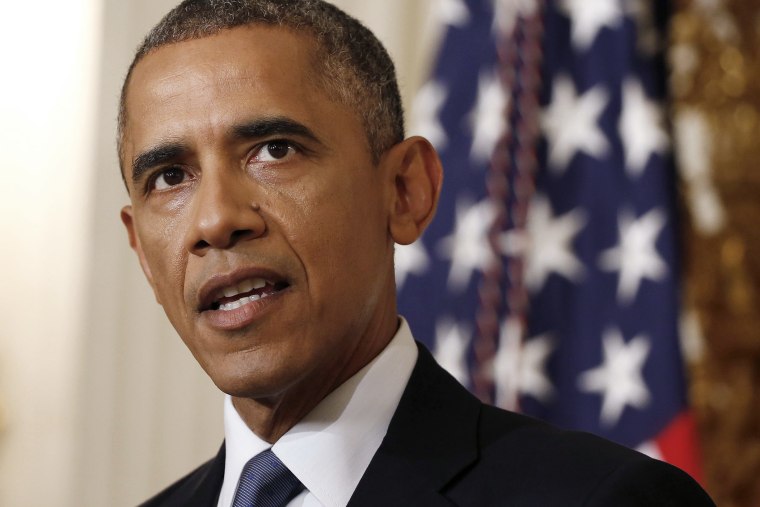President Obama announced Thursday that he had authorized targeted airstrikes in Iraq and carried out a humanitarian airdrop to aid thousands of religious minorities trapped in the mountains by Sunni militants.
"I said in June, as the terrorist group ISIL began an advance across Iraq that the U.S. would be prepared to take targeted military action in Iraq if and when we determined that the situation required it," the president said in an address from the White House. "In recent days, these terrorists have continued to move across Iraq, near the city of Erbil where American diplomats and civilians serve at our consulate and American military personnel advise Iraqi forces."
"To stop the advance on Erbil I've directed our military to take targeted military strikes against ISIL convoys should they move toward the city," Obama added. "We intend to stay vigilant and take action if these terrorist forces threaten our personnel or facilities anywhere in Iraq, including our consulate in Erbil and our embassy in Baghdad."
The president also announced that the U.S. had completed a humanitarian air operation to bring aid to tens of thousands of refugees who were forced to flee the Iraqi city of Mosul or face execution by Sunni militants if they did not convert to Islam. As many as 40,000 members of religious minorities have taken shelter atop Mount Sinjar in northern Iraq in recent days, where they have been without food or water. UNICEF reported that 40 children from the group have died.
The U.S. airdrop involved one C-17 and two C-130 cargo aircraft, according to a defense official, which together dropped 5,300 gallons of drinking water and 8,000 meal packets. The planes were escorted by two F-18 fighter jets and flew at a low altitude over the drop site for less than 15 minutes. The president has authorized "continual drops as necessary" to assist the refugees, senior U.S. officials said after Obama's speech. The Iraqi government and Kurdish pesh merga forces are also providing assistance, they said.
Obama made clear that he believes the religious minorities, which include Christians and Yazidis, "a small and ancient religious sect," faced the possibility of genocide at the hands of terrorist forces unless the U.S. intervened. He said he had authorized targeted air strikes to help Iraqi forces break the siege at the base of the mountain to protect the trapped civilians.
"I've said before the U.S. cannot and should not intervene every time there's a crisis in the world," the president said. But with a "mandate to help" from the Iraqi government and "the unique capabilities to help avert a massacre," the U.S. "cannot turn a blind eye," he continued. "We can act, carefully and responsibly, to prevent a potential act of genocide."
For several weeks, the U.S. has been flying F-18 fighter jets, B-1 bombers and Predator drones over Iraq, U.S. officials told NBC News ahead of the president's speech. Those aircraft are now poised to launch strikes to protect U.S. assets in Erbil -- which include a U.S. consulate with 30-50 State Department personnel and scores of military advisers -- should ISIS militants continue their advance on the city.
Obama acknowledged in his speech that he had run for president in part to end the war in Iraq, and said Americans were rightly concerned about additional military action. "As Commander-in-Chief, I will not allow the United States to be dragged into fighting another war in Iraq," the president said, emphasizing that combat troops would not be returning to Iraq. But he insisted "people all over the world look to the United States of America to lead."
"When many thousands of innocent civilians are faced with the danger of being wiped out, and we have the capacity to do something about it, we will take action," he said. "That is our responsibility as Americans. That's a hallmark of American leadership. That's who we are."
"We can act, carefully and responsibly, to prevent a potential act of genocide."'
